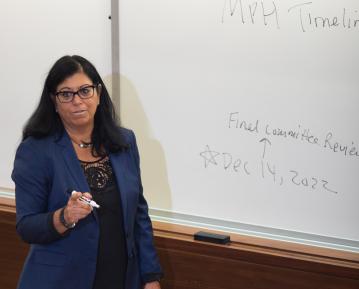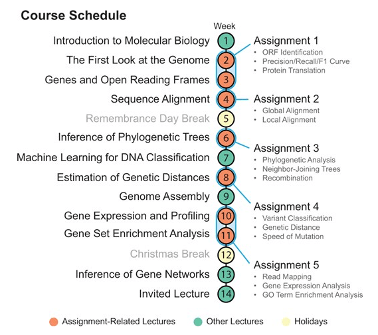Not known Details About Bioinformatics Tutor
Not known Details About Bioinformatics Tutor
Blog Article
Fascination About Bioinformatics Tutor
Table of ContentsWhat Does Bioinformatics Tutor Do?Everything about Bioinformatics TutorWhat Does Bioinformatics Tutor Do?The Buzz on Bioinformatics TutorRumored Buzz on Bioinformatics Tutor
Of the total amount individuals associated with the training, 80% were pupils from public greater education establishments, while the remaining 20% came from private organizations. To receive a certification of participation, pupils were called for to participate in at the very least 90% of the overall training hours. As an outcome of this requirement, an excellent 95% of the individuals successfully acquired their certificates, having not only fulfilled the minimum presence standards yet likewise completed all appointed activities throughout the training.
During the elevation of the COVID-19 pandemic, especially in between June and August 2020, the job team was tasked with arranging specialized training in bioinformatics. This training was specifically targeted at pupils from the research study group Center for Research in Applied Computing at the Federal University of Pará (UFRA) The adjustment to remote understanding platforms due to the pandemic produced a possibility to explore new teaching methods and digital tools that improved both reach and effectiveness.
This training course was designed to give an easily accessible yet thorough overview of Artificial Intelligence strategies, specifically as applied in bioinformatics (Bioinformatics Tutor). This online style allowed engagement from pupils across Brazil, numerous of whom may not have had the possibility to attend in-person sessions.
Fascination About Bioinformatics Tutor
A notable function of this training course was its emphasis on hands-on learning. About 50% of the overall training hours were dedicated to practical tasks where trainees built smart models and applications in a variety of scientific domains, including genetics, molecular biology, and environmental information analysis. Extensively used devices and structures such as Spyder, Google Colab, Jupyter Notebooks, and Orange were incorporated into the coursework. These platforms enabled trainees to participate in real-time information manipulation, design training, and formula trial and error.
Sixty of them were associated with numerous higher education establishments in the state of Pará, while the staying twenty came from institutions found in 5 various other Brazilian states. By presenting Artificial Knowledge in a sensible and pertinent context, the effort served to connect the space in between theory and real-world application, giving trainees with a solid foundation for future research study or work in the area.
The training effort developed component of a more comprehensive scholastic outreach effort known as the Bioinformatics when traveling task. This project has, throughout the years, presented dozens of trainees to the world of bioinformatics and computational biology. The events held under this umbrella effort have actually happened across multiple areas and years, as summarized in Table 1 (List of occasions, areas, years, and overall varieties of students and instructors)
Several of these groups, originally brought with each other by their involvement in training events, have actually considering that gone on to produce independent clinical study in collaboration with local scholastic organizations. The training not just fostered scientific reasoning within the context of bioinformatics but also sparked collective relationships that extended beyond the training atmosphere.
The Buzz on Bioinformatics Tutor
The same team, leaving out IH and RR, additionally acted as tutors for the sensible training modules. Funding for the project was supplied through the grant 88887.200562/ 2018-00 from CAPES.
The Federal College of Pará's Office of Research (PROPESP/UFPA) also provided monetary assistance, particularly for the manufacturing of the final manuscript. The authors declare no economic or industrial problems of passion that can have influenced the research study. In addition, all interpretations and opinions shared in this write-up are only those of the writers and do not always mirror those of their visit our website particular institutions, the publisher, editors, or reviewers included in the magazine process.

Excitement About Bioinformatics Tutor
From an instructional point of view, the mentor method used in the training was deliberately interactive. Courses were conducted in a manner that urged student engagement and discussion, going beyond rote memorization to check out how ideas are developed, used in every day life, and evaluated in academic setups. The educational ideology concentrated on nurturing both solid and struggling trainees, offering customized assistance, and building self-confidence via continual mentorship and perseverance.

Each team, containing roughly 36 individuals, was sustained by 3 coaches-- a lot of whom were postdoctoral scientists with customized competence. These mentors not just assisted create the team tasks yet additionally facilitated their implementation, making sure that each research inquiry was both suitably challenging and relevant. The goal was to supply a biologically reasonable context that participants could check out with open-ended purposes and access to curated datasets.
For added understandings right into the methodology and results of this project-based understanding technique, viewers are directed to S1 Text, which includes thorough summaries of the instructional framework, examination strategies, and job motifs made use of in the training sessions.
Bioinformatics Tutor Fundamentals Explained
Of the total amount individuals included in the training, 80% were trainees from public greater education establishments, while the staying 20% came from exclusive institutions. To certify for a certificate of engagement, trainees were needed to participate in at least 90% of the complete training hours. Notably, past the pupils who enlisted in the training sessions, 7 experienced instructors participated in delivering the courses, while 3 devoted research teachers worked with the overall training procedure. Around 50% of the overall training hours were dedicated to functional activities where students built smart designs and applications in a range of clinical domain names, including genetics, molecular biology, and environmental information evaluation. The training not just cultivated scientific reasoning within the context see this page of bioinformatics but also stimulated collaborative connections that extended past the training setting.
Report this page